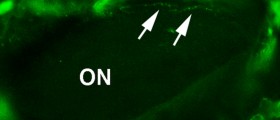
Hyperstimulation syndrome is a condition that causes enlarged ovaries and can be very dangerous. In some serious, but rare cases can even cause ovaries to rupture. Ovarian hyperstimulation syndrome symptoms include upset stomach and bloating, stomach enlargement, sometimes vomiting and diarrhea and even weight gain. For this reason, if you are noticing some of these symptoms, you should contact your fertility specialist immediately. Approximately 10% of women who are treated with Clomid have twins (multiple pregnancy), which is not so bad side effect if you ask me.
On the other hand, approximately 30% of women have more serious Clomid side effect: a hostile fertile mucous and thinning the uterine lining, which means that consequently conception is even harder, since thinned uterine can cause an early miscarriage or can prevent conception, and the hostile mucus can kill sperm. As much as 13% of women will experience enlarged ovaries, up to 10 % of women will have to deal with hot flashes, and up to 5% will have problems with abdominal pain or bloating or pelvic pain, 2% of women will experience vomiting and upset stomach (nausea), and breast pain, and as little as 1% of women who are treated with this fertility treatment will have to deal with headache and abnormal menstrual bleeding, which also includes spotting between periods, or will experience heavy and long periods. Less than 1% will experience signs of an allergic reaction, such as itching or hives, or unexplained swelling, or unexplained rash, or sometimes wheezing, or difficulty swallowing and breathing.
In conclusion, as with any medicine, Clomid side effects are possible, but not everyone who takes this fertility drug will experience side effects. As a matter of fact, most women will tolerate Clomid well, and most sources claim that even if they do develop Clomid side effects, in most cases these side effects will be minor, which means that women will be easily treated by their healthcare provider or won't need any treatment at all.













_f_280x120.jpg)


Your thoughts on this
Loading...